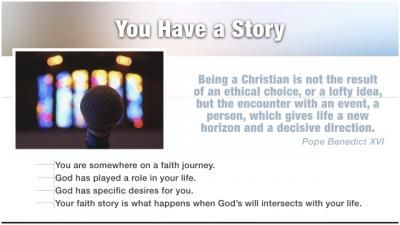The Making Disciples Today Blog has reflections to help you grow in your journey of missionary discipleship, reviews on recommended Catholic evangelization resources, and practical insight on how to evangelize in your daily life.
- Details
- Written by Kristin Bird
The most valuable way to share our faith is by telling our own story, our testimony of the difference Jesus Christ has made in our lives, in a firsthand account. Can you idenitfy the key elements of your personal journey to discipleship? Can you articulat what difference Jesus has made in your life?
We've collated and created some tools to help you expand the role of story in evangelizing including some reflection guides, practical tips, and suggestions on how to think about both incorporating story in a general way and sharing your own story.
- Details
- Written by Kristin Bird
If you were certain that the God of the universe delighted in you, would it change your life in any way? We hear others say that God loves us, yet sometimes we may feel unloved. We all have a deep longing, a desire to know that we are loved deeply. With an awareness of unchanging love, we find a settled security for our lives.
The concept of “love languages” can help us understand how God communicates His love to us and how we in turn can respond to that love. It could be that we are trying to receive God’s love in a language we do not speak well. Instead, consider trying to let God love you the way He created you to best receive love - through your primary Love Language(s).
- Details
- Written by Steve Anderson
Sacramentals are a part of most Catholics’ prayer lives. Before we jump to how to evangelize with sacramentals, we need to understand what they are. A quick review on the difference between sacraments and sacramentals...
Sacraments
Sacraments are actions of the Holy Spirit at work in the Church (CCC 1116). These actions are a visible symbol of invisible reality, signs that communicate the grace they signify (CCC 1127). God speaks to us through his visible creation and is incarnate (made flesh) in the visible world.
Christ used physical signs and symbolic gestures as a visual means to help those he was healing understand the invisible reality. He used spit and clay to heal the man born blind (John 9:1-12), healed the deaf man by placing his finger in his ear, spitting and touching his tongue (Mark 7:31-37) and by spitting on the blind man’s eyes and laying his hands on him (Mark 8:22-26).
God, who created us body and soul, communicates his truth to us not only through ideas and words, but through sensible signs as well.
Sacramentals
Sacramentals, on the other hand are objects intended to strengthen our faith by reminding us of God’s presence in our lives and calling us to prayer. They are different than the sacraments in that they are instituted by the Church versus sacraments which originate in Christ.
- Details
- Written by Amy Brooks
Huge thank you to Amy Brooks at Prayer, Wine & Chocolate for this list of tips for staying focused in prayer - and for permission to reblog it as part of our How Do You Pray? series.
I have never been tested for ADHD; however, I am certain, I would pass that test with flying colors.
So, I write this post with great empathy for those who have trouble staying focused during prayer time.
(Note: Our Executive Director, Kristin, has been tested and is being treated for ADHD, so we totally understand the sometimes challenging task of staying focused. You can also check out: Overcoming Distractions & Anxieties in Prayer.)





